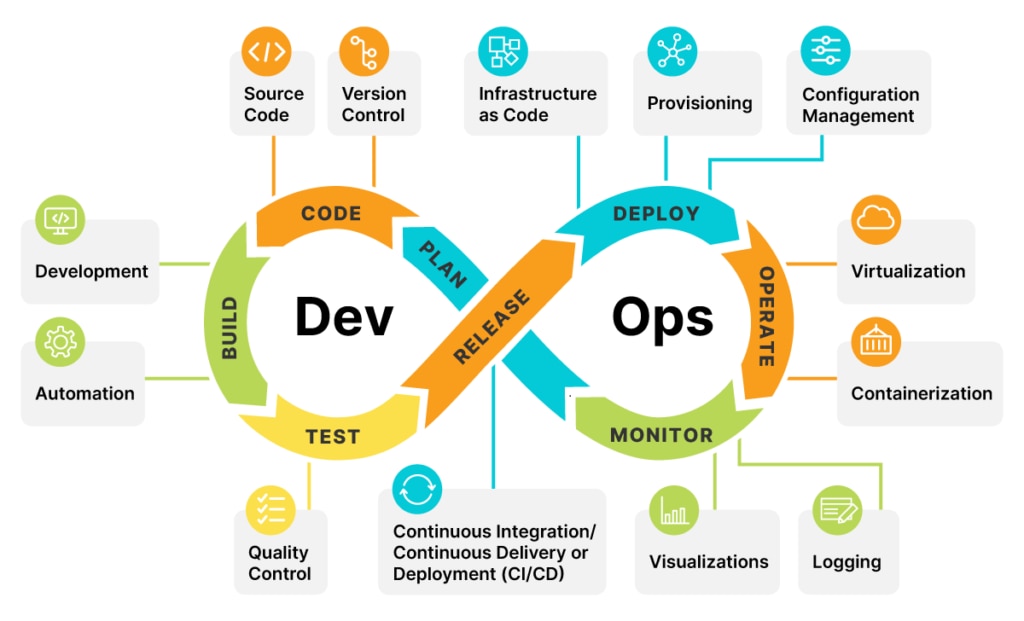DevOps Strategies for Success

The rise of the DevOps mindset marks a significant shift in the software development landscape, emphasizing collaboration, automation, and continuous improvement. By breaking down traditional silos between development and operations teams, DevOps fosters a culture of shared responsibility and seamless communication. This approach accelerates the development cycle, enhances the reliability of applications, and enables rapid, iterative releases. As organizations adopt DevOps, they experience increased agility, improved quality, and a stronger alignment with business objectives, ultimately leading to more innovative and resilient systems.
DevOps is not just a set of tools or a single department within an organization; it is a cultural and technical movement that aims to break down silos between development and operations teams. The primary goal of DevOps is to foster collaboration, automate processes, and ensure a continuous and efficient software delivery pipeline.

-
Successful DevOps implementation hinges on establishing a strong DevOps culture within your organization. This culture fosters open communication, mutual responsibility, and a focus on continuous enhancement. Key components of a DevOps culture include:
-

In the realm of DevOps, automation stands as more than just a trend; it's the cornerstone of operational efficiency. Platforms like Google Cloud Platform (GCP) and GitLab enable teams to automate routine tasks, minimizing human error and hastening the development life cycle. By automating processes like testing, deployment, and infrastructure setup, teams liberate valuable time for innovation.
The surge in the shift-left approach has propelled Infrastructure as Code (IaC) to the forefront of DevOps methodology. With IaC, teams can define and manage infrastructure declaratively, ensuring uniformity and repeatability. Utilizing tools such as Ansible or Azure Resource Manager, DevOps practitioners encode infrastructure, bolstering collaboration and version control.
Continuous integration and continuous deployment (CI/CD) remain pivotal in modern DevOps landscapes. By automating integration and deployment workflows, development teams deliver code iterations swiftly and reliably. This not only expedites delivery timelines but also curtails the incidence of production defects.
Security is an integral part of the DevOps pipeline. DevSecOps practices ensure that security is not compromised in the pursuit of speed and efficiency. Security considerations are integrated into every phase of the development and deployment processes to protect against vulnerabilities and threats.
It's imperative for DevOps methodologies to conform to the regulatory standards pertinent to an organization's sector. Automation frequently serves as the linchpin in enforcing these regulations consistently, mitigating the potential for non-compliance and the ensuing repercussions.
Containers, propelled by technologies like Kubernetes, have emerged as linchpins in ensuring consistency across diverse environments. Orchestrators like Docker Swarm bolster scalability and manageability. Containerization guarantees uniform application execution across the development spectrum, from inception to production, streamlining deployment workflows.
DevOps transcends mere toolsets and methodologies; it embodies a cultural transformation that champions collaboration across development and operations teams. Nurturing transparent communication, shared accountabilities, and dismantling organizational silos cultivates an inclusive environment where teams collaborate synergistically towards common objectives.
Proactive monitoring and observability are indispensable for preempting and rectifying issues before they disrupt user experiences. The emphasis lies on instantaneous insights into application performance, infrastructure robustness, and user interaction. Platforms like Jenkins and Prometheus afford the insights requisite for ensuring peak system performance.
With enterprises increasingly embracing multi-cloud strategies, ensuring interoperability across platforms is paramount. DevOps frameworks must seamlessly adapt to diverse cloud providers like IBM Cloud or Oracle Cloud, facilitating frictionless integration and deployment across heterogeneous environments.
DevOps teams establish robust disaster recovery plans to minimize downtime and data loss in the event of unexpected failures or disasters. These plans are essential for ensuring business continuity and data integrity.
DevOps cultivates an environment primed for innovation, empowering teams to experiment and embrace novel technologies and methodologies in a perpetual quest to refine processes. This ethos fuels creativity and flexibility, enabling organizations to remain agile and relevant amidst dynamic industry shifts.
To perpetually refine DevOps methodologies, it's imperative to gauge and analyze critical metrics. Tracking indicators such as deployment cadence, cycle time, and incident response duration furnishes invaluable insights into pipeline efficiency and efficacy. These metrics serve as signposts, guiding teams in identifying optimization opportunities and refining their workflows.
-

In summary, DevOps revolutionizes software development and IT operations by promoting collaboration, automation, and continuous improvement. With benefits like faster delivery, improved quality, and enhanced scalability, DevOps fosters innovation, aligns with business goals, and ensures resilience. Embracing DevOps principles empowers organizations to thrive in today's competitive landscape.
#DevOps #CICD #Collaboration #Automation #Cloud
---
At Meuwic, we understand the complexities of implementing DevOps practices. Our Managed Cloud Services are designed to provide you with the tools, expertise, and support necessary to succeed. We help you integrate, automate, and optimize your operations, ensuring that your infrastructure is robust and efficient. We are here to assist you every step of the way. Get in touch with us today to find out how we can help you achieve your Cloud & DevOps objectives.
Book a free consultation with us here.